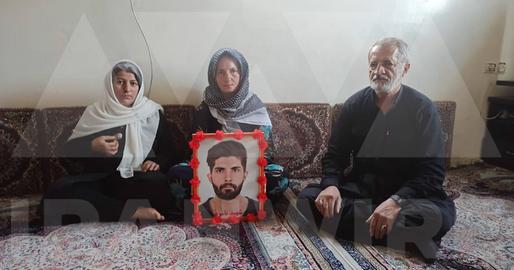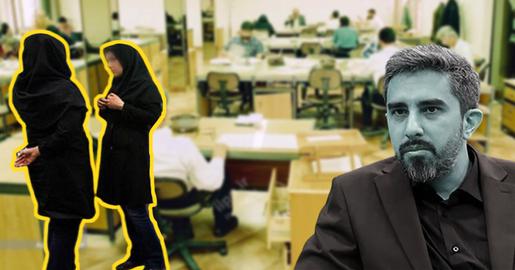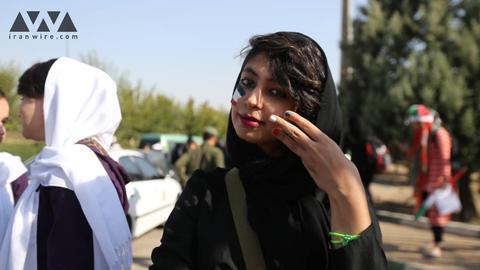A celebrity has been summoned to appear before an “Islamic guidance” court after photographs of her wearing “unconventional attire” to a private screening went viral.
State media criticized Iranian actress Matin Sotoudeh for wearing a white flowing blouse and a loose-fitting headscarf instead of more traditional Islamic clothing to a screening of the film Maskharehbaz (“Fooling Around”) on October 13, prompting many of the country’s religious and political hardliners to vilify her on social media.
Three days later, on October 16, the Minister of Culture and Islamic Guidance was summoned to the parliament, and asked to talk about the work of the ministry’s newly-established “celebrity council,” which was set up to review the behavior and dress of celebrities. At the same time, Iran’s Cinema Organization said it would be publishing guidelines for what constituted acceptable attire. A few hours later, Tasnim News Agency, which is affiliated with the Revolutionary Guards, reported that Sotoudeh had been summoned to the guidance court following numerous complaints about her. Details of the court proceedings are unclear.
Sotoudeh was summoned to the guidance court after she and other celebrities posed for photographs on a red carpet outside the cinema where the screening took place, and images of her wearing unconventional dress — albeit with her head covered as demanded by law in the Islamic Republic — were quickly shared on social media.
The photographs were then shown on 20:30, a television program that regularly profiles individuals who have in some way been deemed to have violated the values of the Islamic Republic. Sotoudeh and other celebrities were singled out for dressing in a culturally inappropriate manner, and accused of being careless when it came to ensuring they were adequately covered.
A Carefully-Worded Apology
Posting on Instagram on Thursday, October 17, Sotoudeh apologized to anyone who was offended by the photographs, including “the families of martyrs” — language that suggests she was pressured to make such a statement.
In an obvious attempt to placate Iran’s fundamentalists, she wrote: “I did not have any intention of going against the norm, and if my attire led the enemy media to use this for their own purposes, I sincerely apologize.”
The 34-year-old actress, who has appeared in popular TV series including Lisansehha, Foghelisansehha and Mikaeel, likely hoped her apologies would put an end to the controversy, but it will no doubt remain a focus of Iranian media and social media for some time.
Authorities responsible for drawing up guidelines and monitoring appropriate dress and behavior for celebrities both spoke to state media about the measures.
Masoud Najafi, the head of public relations at the Cinema Organization, talked in further detail about the guidelines being prepared for figures in arts, cinema, and sports who attend public events. Referring to the “unconventional attire” of some celebrities, he said, “It is obvious that behavior outside of our cultural norms is unacceptable.”
Sadegh Tabatabai Nejad, the head of the Islamic Consultative Assembly’s culture committee, said the new “celebrities council” formed four months ago under the Ministry of Culture and Islamic Guidance was already “working to pass rules and regulations regarding these cases.”
Speaking about the cultural minister’s appearance before parliament, he said, “We should seriously survey this area, and present guidelines for private events. We have also asked the Minister of Culture and Islamic Guidance to share his approach for combatting inappropriate behavior.”
Sadegh Tabatabai Nejad also described why the celebrities council is necessary: “There are images of some celebrities at events like Fajr Festival that violate Islamic rules and principles. We formed the council as part of the ministry of culture, and an associate minister will preside over these cases.”
Ahmad Salek, the vice president of the Islamic Consultative Assembly’s cultural committee, told Tasnim News Agency, “Apart from the cultural and Islamic guidance minister, we also remind the parliament’s representative for the Islamic Republic Iran Broadcasting to search for serious solutions to this problem.”
He asserted that some celebrities spread perversion in society: “Our enemies are trying to promote uncovering [removing hijab] in Iran with their liberal thinking. There are pictures and videos taken in Isfahan where women are singing and dancing without wearing headscarves in tourist locations like Khaju Bridge or Chaharbagh. Promoting this kind of behavior damages our value-based-culture, chastity and purity. Some celebrities are damaging these values by wearing off-beat cloths and unconventional makeup — promoting perversion.”
Referring to Sotoudeh’s case, Seyed Abbas Salehi, the minister for culture said: “The event was not a public event, so artists didn’t need our permission for attending.”
Despite the minister’s defense of the celebrities, and the insistence that the ministry did not need to vet TV stars on attendance at non-official engagements, the council’s guidelines are due to be published during the week of October 21.
In an interview with Iran newspaper, Parvin Dadandish, the consultant for social affairs at the Ministry of Culture and Islamic Guidance, says that institutions with no links to cultural matters should not pressure celebrities. However, in another part of the same interview, she welcomed the idea of a celebrity council: “I can imagine that this council will help to clarify. It could play a protective role for artists,” she said, adding that once people were aware of what was expected of them, there would be fewer instances where they would be referred to the council. This, she said, would “avoid the intervention of other institutions and the media.”
A History of Harassment
How artists and athletes conduct themselves in the public sphere has become a growing issue for Iranian authorities. In the past, Abbas Jafari Dolatabadi, Tehran’s prosecutor, used a press conference to warn them to be careful what they publish on social media. “The court will use the public aspect of the crime to penalize celebrities who publish pictures and posts that are in contravention of Islamic rules,” he said.
Former culture minister Ali Jannati had also commented on the matter: “Artists are not allowed to give interviews with the media abroad or satellite television channels,” he said, warning that if they did, they would not be entitled to the protection of the ministry.
Actress Leyla Hatami has also faced attacks from Iran’s hardliners. In 2014, she offended them by shaking hands with the president of the Cannes Film Festival, and she too was forced to publish a statement saying she regretted what she had done. “I am so sorry for hurting people's feelings,” she wrote in her apology. “Mr Gilles Jacob is 90 years old and it is his last year of being the president of Cannes,” she wrote. She then said that because of his age, “he forgot the rules,” adding that she had tried to refrain from shaking his hand. “In my eyes, he is certainly like an old grandfather who was also my host,” she continued. “I feel ashamed to explain the details of this event, but everybody knows that I am the child of a man who loved his religion and his nation,” reminding the public of her famous film director father, Ali Hatami.
Fatemeh Motamed Aria also found herself the target of attacks from hardliners because of her political views, and because of how she presented herself at events abroad. For years, the actress has been blacklisted from state television, and she has had limited presence in Iranian cinema.
Due to these increasing pressures, many actors and actresses have left Iran over the years — as have artists, filmmakers and others working in the creative industries. They highlight the intimidation and harassment they faced as one of the chief reasons for leaving. Instead of trying to make it easier for Iranian talent to thrive in the country, authorities have shown their commitment for isolating these celebrities and hampering their success.




























comments